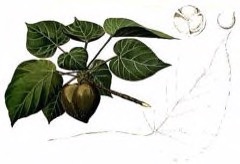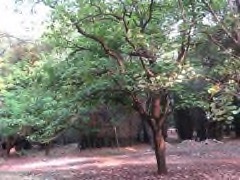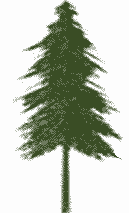 |
|
http://www.edibleplants.org |
 |
| Forestowlet wikimedia.org |
Translate this page:
Summary
Reutealis trisperma or commonly known as Otaheite Walnut or Lumbang Tree is a fast-growing evergreen tree endemic to the Philippines. It grows up to 15 m in height and 35cm in bole diameter. Its fruits are poisonous and no plant part is edible. However, the tree is used medicinally for parasitic skin diseases, burns, scalds, wounds, and dandruff. Seed oil is used for the production of paints, varnishes, soaps, for coating boats, or as fuel oil.
Physical Characteristics

 Reutealis trisperma is an evergreen Tree growing to 12 m (39ft) by 12 m (39ft) at a fast rate.
Reutealis trisperma is an evergreen Tree growing to 12 m (39ft) by 12 m (39ft) at a fast rate.
See above for USDA hardiness. It is hardy to UK zone 10.
Suitable for: light (sandy), medium (loamy) and heavy (clay) soils and prefers well-drained soil. Suitable pH: mildly acid, neutral and basic (mildly alkaline) soils. It cannot grow in the shade. It prefers moist soil.
UK Hardiness Map
US Hardiness Map
Synonyms
Aleurites saponarius Blanco Aleurites trispermus Blanco Camerium trispermum (Blanco) Kuntze
Plant Habitats
Edible Uses
Edible Parts: Oil
Edible Uses: Oil
The oil is used medicinally but no edible uses have been found.
References More on Edible Uses
Medicinal Uses
Plants For A Future can not take any responsibility for any adverse effects from the use of plants. Always seek advice from a professional before using a plant medicinally.
Parasiticide Skin
The plant has medicinal uses[266 ]. It is probably the oil that is used. This is similar to tung oil, obtained from Aleurites spp., which is used externally to treat parasitic skin diseases, burns, scalds and wounds[K ]. The sap of the bark is used to cure scurf of the head[345 ].
References More on Medicinal Uses
The Bookshop: Edible Plant Books
Our Latest books on Perennial Plants For Food Forests and Permaculture Gardens in paperback or digital formats.

Edible Tropical Plants
Food Forest Plants for Hotter Conditions: 250+ Plants For Tropical Food Forests & Permaculture Gardens.
More

Edible Temperate Plants
Plants for Your Food Forest: 500 Plants for Temperate Food Forests & Permaculture Gardens.
More

More Books
PFAF have eight books available in paperback and digital formats. Browse the shop for more information.
Shop Now
Other Uses
Fertilizer Hair Insecticide Lighting Oil Paint Parasiticide Soap making Varnish
Agroforestry Uses: The seed cake residue, after the extraction of oil, is a good fertilizer[345 ]. Other Uses A high-quality, quick-drying oil is obtained from the seed[345 , 377 ]. The seeds contain 56% oil (bagilumbang oil). It is utilized for the production of paints, varnishes, soaps and for coating boats or as fuel oil[317 ]. The oil was formerly employed in the Philippines for the production of a weak soap which was in demand among sailors owing to its property of lathering in sea water[327 ]. The oil is an effective insecticide[345 ]. The oil is similar to tung oil, obtained from Aleurites spp.[377 ]. Tung oil is a very fast-dring oil with a wide range of applications, including medicinal[K ]. The oil is of best quality only when obtained from the fresh seeds, it deteriorates if not stored in hermetically sealed containers[345 ]. The shells are easily cracked and the oil obtained from the pressed, shelled seeds is of much higher quality than that obtained from crushing the seeds in their shells[345 ].
Special Uses
References More on Other Uses
Cultivation details
Plants can be grown in subtropical to tropical areas. They can tolerate occasional short-lived frosts with temperatures falling to about -2°c[377 ]. A fast-growing tree, it can be 5 metres or more tall when 5 years old[345 ]. Trees commence fruiting within a few years from seed[345 ].
References Carbon Farming Information and Carbon Sequestration Information
Temperature Converter
Type a value in the Celsius field to convert the value to Fahrenheit:
Fahrenheit:
The PFAF Bookshop
Plants For A Future have a number of books available in paperback and digital form. Book titles include Edible Plants, Edible Perennials, Edible Trees,Edible Shrubs, Woodland Gardening, and Temperate Food Forest Plants. Our new book is Food Forest Plants For Hotter Conditions (Tropical and Sub-Tropical).
Shop Now
Plant Propagation
Seed - sown fresh a germination rate of 98% can be achieved within 19 days[345 ]. Seedlings can be 54cm tall within 12 months[345 ].
Other Names
If available other names are mentioned here
Lumpang banucalag, Balukanad,
Native Range
TROPICAL ASIA: Philippines (Luzon, Mindanao, Negros)
Weed Potential
Right plant wrong place. We are currently updating this section.
Please note that a plant may be invasive in one area but may not in your area so it's worth checking.
Conservation Status
IUCN Red List of Threatened Plants Status : Status: Vulnerable A1cd

Growth: S = slow M = medium F = fast. Soil: L = light (sandy) M = medium H = heavy (clay). pH: A = acid N = neutral B = basic (alkaline). Shade: F = full shade S = semi-shade N = no shade. Moisture: D = dry M = Moist We = wet Wa = water.
Now available:
Food Forest Plants for Mediterranean Conditions
350+ Perennial Plants For Mediterranean and Drier Food Forests and Permaculture Gardens.
[Paperback and eBook]
This is the third in Plants For A Future's series of plant guides for food forests tailored to
specific climate zones. Following volumes on temperate and tropical ecosystems, this book focuses
on species suited to Mediterranean conditions—regions with hot, dry summers and cool, wet winters,
often facing the added challenge of climate change.
Read More
Expert comment
Author
(Blanco) Airy Shaw
Botanical References
Links / References
For a list of references used on this page please go here
A special thanks to Ken Fern for some of the information used on this page.
Readers comment
| Add a comment |
|
If you have important information about this plant that may help other users please add a comment or link below. Only comments or links that are felt to be directly relevant to a plant will be included. If you think a comment/link or information contained on this page is inaccurate or misleading we would welcome your feedback at [email protected]. If you have questions about a plant please use the Forum on this website as we do not have the resources to answer questions ourselves.
* Please note: the comments by website users are not necessarily those held by PFAF and may give misleading or inaccurate information.
To leave a comment please Register or login here All comments need to be approved so will not appear immediately.
|
Subject : Reutealis trisperma
|
|
|
|